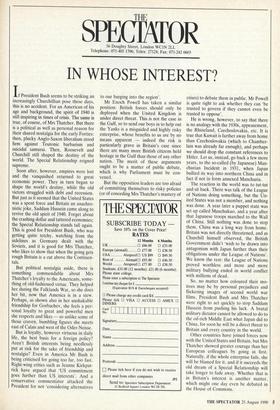SPECTAT iiii OR
56 Doughty Street, London WCIN 2LL Telephone: 071-405 1706; Telex: 27124; Fax: 071-242 0603
IN WHOSE INTEREST?
If President Bush seems to be striking an increasingly Churchillian pose these days, this is no accident. For an American of his age and background, the spirit of 1940 is still inspiring in times of crisis. The same is true, of course, of Mrs Thatcher. But there is a political as well as personal reason for their shared nostalgia for the early Forties: then, plucky Anglo-Saxon liberalism stood firm against Teutonic barbarism and suicidal samurai. Then, Roosevelt and Churchill still shaped the destiny of the world. The Special Relationship reigned supreme.
Soon after, however, empires were lost and the vanquished returned to great economic power. They in turn began to shape the world's destiny, while the old victors struggled with debt and recession. But just as it seemed that the United States was a spent force and Britain an anachro- nistic joke, Saddam Hussein came along to revive the old spirit of 1940. Forget about the crashing dollar and tattered economies; the Special Relationship stands tall again. This is good for President Bush, who was getting quite tetchy, watching from the sidelines as Germany dealt with the Soviets, and it is good for Mrs Thatcher, who likes to show that when the going gets rough Britain is a cut above the Continen- tals.
But political nostalgia aside, there is something commendable about Mrs Thatcher's loyalty to the Americans, some- t hing of old-fashioned virtue. They helped her during the Falklands War, so she does her bit, now that America is in a stew. Perhaps, as shown also in her unshakable friendship for Gorbachev, she feels a per- sonal loyalty to great and powerful men she respects and likes — so unlike some of those craven, bumbling figures she meets east of Calais and west of the Oder-Neisse.
But is loyalty, however virtuous in daily life, the best basis for a foreign policy?
Aren't British interests being needlessly put at risk for the sake of friendship and nostalgia? Even in America Mr Bush is being criticised for going too far, too fast.
Right-wing critics such as Jeanne Kirkpat- rick have argued that `US commitment goes further than US, interests'. And a conservative commentator attacked the President for not 'considering alternatives to our barging into the region'.
Mr Enoch Powell has taken a similar position: British forces should only be deployed when the United Kingdom is under direct threat. This is not the case in the Gulf, so to send our boys in to help out the Yanks is a misguided and highly risky enterprise, whose benefits to us are by no means apparent — indeed the risk is particularly grave in Britain's case since there are many more British citizens held hostage in the Gulf than those of any other nation. The merit of these arguments ought to be a matter of public debate, which is why Parliament must be con- vened.
But the opposition leaders are too afraid of committing themselves to risky policies (or of conceding Mrs Thatcher's mastery of crises) to debate them in public. Mr Powell is quite right to ask whether they can 'be trusted to govern if they cannot even be trusted to oppose'.
He is wrong, however, to say that there is no analogy with the 1930s, appeasement, the Rhineland, Czechoslovakia, etc. It is true that Kuwait is farther away from home than Czechoslovakia (which to Chamber- lain was already far enough), and perhaps we should drop the constant references to Hitler. Let us, instead, go back a few more years, to the so-called (by Japanese) Man- churian Incident in 1931, when Japan bullied its way into northern China and in fact if not in form annexed Manchuria.
The reaction in the world was to tut-tut and sit back. There was talk of the League of Nations doing something, but the Un- ited States was not a member, and nothing was done. A year later a puppet state was set up called Manchukuo, and a year after that Japanese troops marched to the Wall of China. Still nothing was done to stop them. China was a long way from home. Britain was not directly threatened, and as Churchill himself observed, the British Government didn't 'wish to be drawn into antagonism with Japan further than their obligations under the League of Nations'. We know the rest: the League of Nations proved worthless and more and more military bullying ended in world conflict with millions of dead.
So, no matter how coloured their mo- tives may be by personal prejudices and flickering images of second world war films, President Bush and Mrs Thatcher were right to act quickly to stop Saddam Hussein from pushing his luck. A brutal military dictator cannot be allowed to do to the oil-rich Middle East what Japan did to China, for soon he will be a direct threat to Britain and every country in the world.
Other countries have joined forces now with the United States and Britain, but Mrs Thatcher showed greater courage than her European colleagues by going in first. Naturally, if the whole enterprise fails, she will be blamed for it, and if it succeeds the old dream of a Special Relationship will take longer to fade away. Whether that is in Britain's interest is another matter, which might one day even be debated in the House of Commons.










































 Previous page
Previous page